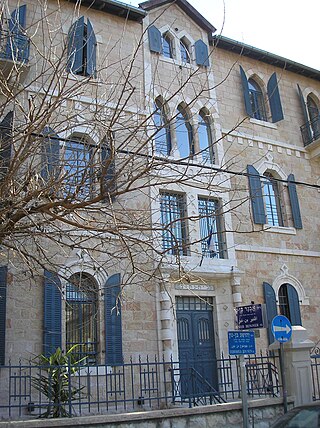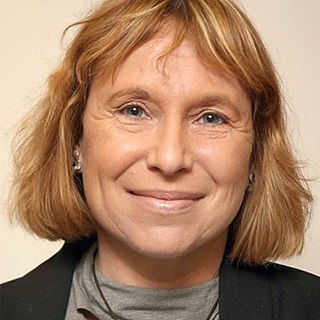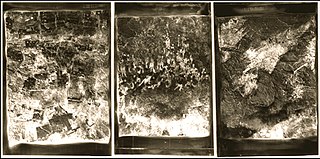Related Research Articles

Christian Zionism is a political and religious ideology that, in a Christian context, espouses the return of the Jewish people to the Holy Land. Likewise, it holds that the founding of the State of Israel in 1948 was in accordance with biblical prophecies transmitted through the Old Testament: that the re-establishment of Jewish sovereignty in the Levant—the eschatological "Gathering of Israel"—is a prerequisite for the Second Coming of Jesus Christ. The term began to be used in the mid-20th century, in place of Christian restorationism, as proponents of the ideology rallied behind Zionists in support of a Jewish national homeland.
Arnaldo Dante Momigliano, KBE, FBA was an Italian historian of classical antiquity, known for his work in historiography, and characterised by Donald Kagan as "the world's leading student of the writing of history in the ancient world". He was a MacArthur Fellow in 1987.
Richard Henry Popkin was an American academic philosopher who specialized in the history of enlightenment philosophy and early modern anti-dogmatism. His 1960 work The History of Scepticism from Erasmus to Descartes introduced one previously unrecognized influence on Western thought in the seventeenth century, the Pyrrhonian Scepticism of Sextus Empiricus. Popkin also was an internationally acclaimed scholar on Christian millenarianism and Jewish messianism.

Elizabeth Eloise Kirkpatrick Dilling was an American writer and political activist. In 1934, she published The Red Network—A Who's Who and Handbook of Radicalism for Patriots, which catalogs over 1,300 suspected communists and their sympathizers. Her books and lecture tours established her as the pre-eminent female right-wing activist of the 1930s, and one of the most outspoken critics of the New Deal, which she referred to as the "Jew Deal". In the mid-to-late 1930s, Dilling expressed sympathy for Nazi Germany.

Anita Shapira is an Israeli historian. She is the founder of the Yitzhak Rabin Center, professor emerita of Jewish history at Tel Aviv University, and former head of the Weizmann Institute for the Study of Zionism at Tel Aviv University. She received the Israel Prize in 2008.

The Treatise of the Three Impostors was a long-rumored book denying all three Abrahamic religions: Christianity, Judaism, and Islam, with the "impostors" of the title being Jesus, Moses, and Muhammad. Hearsay concerning such a book surfaces by the 13th century and circulates through the 17th century. Authorship of the hoax book was variously ascribed to Jewish, Muslim, and Christian writers. Fabrications of the text eventually begin clandestine circulation, with a notable French underground edition Traité sur les trois imposteurs first appearing in 1719.
The University of Chicago Divinity School is a private graduate institution at the University of Chicago dedicated to the training of academics and clergy across religious boundaries. Formed under Baptist auspices, the school today lacks any sectarian affiliations.

Silvia Federici is an Italian-American scholar, teacher, and feminist activist based in New York. She is a professor emerita and teaching fellow at Hofstra University in New York State, where she was a social science professor. She also taught at the University of Port Harcourt in Nigeria from 1984 to 1986. In 1972, with Mariarosa Dalla Costa and Selma James, she co-founded the International Feminist Collective, the organization that launched the campaign for Wages for Housework. In 1990, Federici co-founded the Committee for Academic Freedom in Africa (CAFA), and, with Ousseina Alidou, was the editor of the CAFA bulletin for over a decade. She was also a member of the Academic Association of Africa Scholars (ACAS) and among the voices generating support for the struggles of students across the African continent and in the United States. In 1995, in the course of the campaign to demand the liberation of Mumia Abu-Jamal, she cofounded the Radical Philosophy Association (RPA) anti-death penalty project, an organization intended to help educators become a driving force towards its abolition. From 1979 to 2003, she was a member of the Midnight Notes Collective.

The Shalem Center was a Jerusalem research institute that supported academic work in the fields of philosophy, political theory, Jewish and Zionist history, Bible and Talmud, Middle East Studies, archaeology, economics, and strategic studies.

Nadia Abu El-Haj is an American anthropologist at Barnard College and Columbia University.

Hebraic Political Studies was a quarterly peer-reviewed academic journal published by the Shalem Press, funded by the Shalem Center, and devoted to recovering the Hebraic political tradition and evaluating its place in the history of political thought.
Dagmar Herzog is Distinguished Professor of History and the Daniel Rose Faculty Scholar at the Graduate Center, City University of New York.

Fania Oz-Salzberger is an Israeli historian and writer, Professor Emerita of history at the University of Haifa School of Law and the Haifa Center for German and European Studies (HCGES).

David Nirenberg is an American medievalist and intellectual historian. He is the Director and Leon Levy Professor at the Institute for Advanced Study in Princeton, NJ. He previously taught at the University of Chicago, where he was Dean of the Divinity School, and Deborah R. and Edgar D. Jannotta Distinguished Service Professor of Medieval History and the Committee on Social Thought, as well as the former Executive Vice Provost of the University, Dean of the Social Sciences Division, and the founding Roman Family Director of the Neubauer Family Collegium for Culture and Society. He is also appointed to the Department of Romance Languages and Literatures, the Center for Middle Eastern Studies, the Joyce Z. and Jacob Greenberg Center for Jewish Studies.

Silvia A. Malagrino is an American multimedia artist, independent filmmaker and educator based in Chicago, Illinois. She is known for interdisciplinary work that explores historical and cultural representation, and the intersections of fact, fiction, memory and subjectivity. Her experimental documentary, Burnt Oranges (2005), interwove personal narrative, witness testimony, interviews, and both documentary and re-created footage to examine the long-term effects of Argentina's Dirty War. Malagrino's art has been featured at The Art Institute of Chicago, Palais de Glace and Centro Cultural Recoleta, La Tertulia Museum, Museum of Contemporary Photography of Columbia College Chicago, Chicago Cultural Center, Rochester Institute of Technology, Center for Photography at Woodstock, and Ateneo de Madrid, among other venues. Her work has been recognized by institutions including the Guggenheim Foundation CINE, the Smithsonian Institution, and Bibliothèque nationale de France. Malagrino is Professor in Photography and Moving Image at the School of Art and Art History of the University of Illinois at Chicago.

Esther Seligson was a Mexican writer, poet, translator, and historian. She was an academic, with a wide range of interests including art, cultural history, Jewish philosophy, mythology, religion and theater. She published books, poems, short stories and translations. She won the Xavier Villaurrutia Prize and the Magda Donato Award for her literary contributions.

David Nekrutman is an American-Israeli Orthodox Jewish theologian, writer, director, columnist, public speaker, and pro-Israel activist. He is a prominent figure and pioneer in the world of Jewish-Christian relations and is the former executive director and co-founder of the Center for Jewish-Christian Understanding and Cooperation (CJCUC), co-founder of the Day to Praise global interfaith initiative, and founder of the Blessing Bethlehem aid organization. Nekrutman currently serves as the Executive Director and co-founder of The Isaiah Projects, a ministry dedicated to helping Christians discover the Hebraic roots of their faith. In addition, Nekrutman is a columnist who has written for The Jerusalem Post, Charisma Magazine, and The Times of Israel.

Sidra DeKoven Ezrahi is Professor Emerita of Comparative Literature at the Hebrew University of Jerusalem.

The Girona Synagogue is a former Jewish congregation and synagogue, located in Carrer de Sant Llorenç, Girona, in Catalonia, Spain. No longer in use as a synagogue, the building was initially repurposed as a private residence and, since the 1980s, has been part of the Bonastruc Center and Museum, a Jewish museum.
Emily Marion Harris was an English novelist, poet, and social worker. Many of her writings explored Jewish life in London, and the religious and political conflicts of Jewish traditionalists in the face of increasing assimilation.
References
- ↑ "Silvia Berti" (in Italian). Donzelli editore.
- ↑ Chicago: Chicago University Press, 1994
- ↑ Hebraic Political Studies